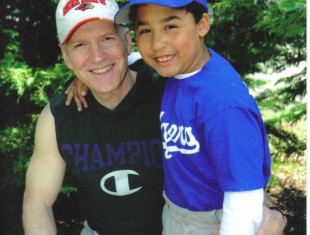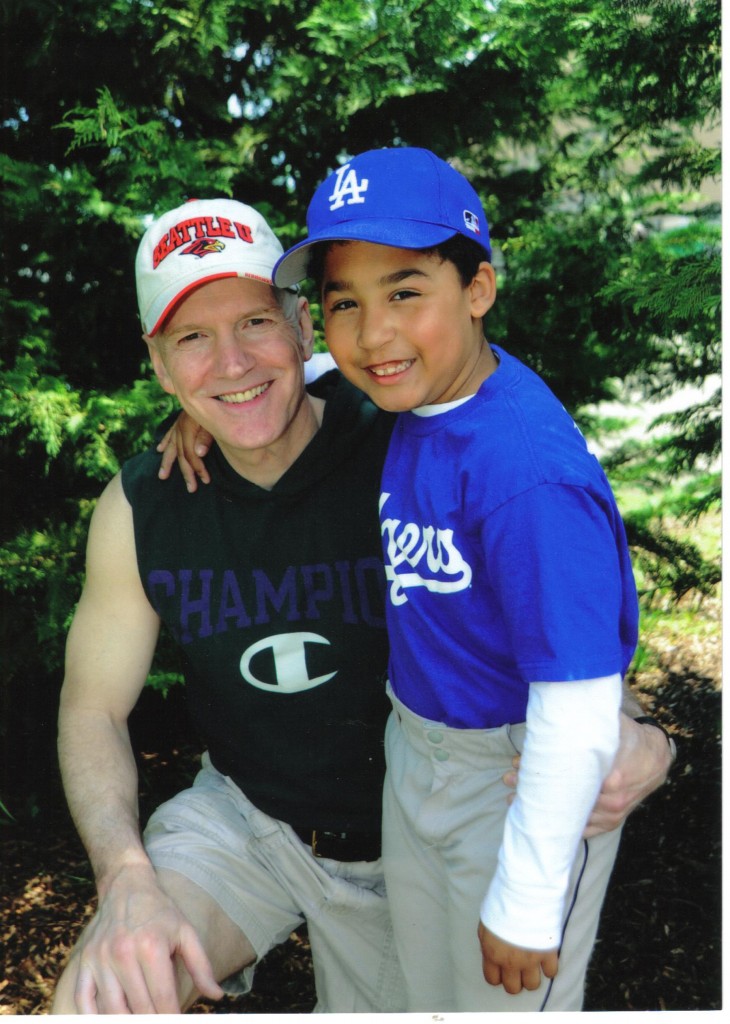CLAY MOYLE AND SON CALEB
By Clay Moyle
Post-concussion Journey Rolls into Week 13
It’s been 13 weeks now since I suffered a grade 3 concussion as a result of a fall off a ladder and I’ve learned a lot more than I ever wanted to know about post-concussion syndrome (PCS).
Although my concussion wasn’t sports related, it’s really caused me to question the risk of concussion many young people subject themselves to in some of those activities. I’ve been surprised to learn just how many young kids suffer concussions from not only sports like football, but many others such as wrestling, soccer, volleyball, and basketball. It also now blows my mind to think of all the time my siblings, friends and myself spent riding bicycles without helmets when we were kids and just how dangerous that really was.
I recently watched an excerpt from a short documentary where a sports agent named Leigh Steinberg shared a story concerning his client Troy Aikman. Aikman was the quarterback for the Dallas Cowboys and he suffered a concussion near the end of a ballgame against the 49ers.
Steinberg was sitting there alone in a dark hospital room with Aikman who’d already been examined by a doctor. Aikman turned to him and asked where they were. Steinberg told him they were in a hospital because he’d suffered a concussion in the game. Aikman asked who they’d played and the outcome of the game. Steinberg explained that they’d defeated the 49ers and would be going to the Super Bowl as a result and Aikman was elated to learn that.
Five minutes later, Steinberg said that Aikman got a confused look on his face and asked him where they were. Steinberg thought he was kidding at first, but once he realized he wasn’t he explained the whole thing again and Aikman was elated all over.
The scenario repeated itself for a third time ten minutes later.
When I shared that story with my wife she told me that the same thing happened with me in the hospital room two hours after my accident. I asked her many questions two or three times.
That type of thing went on for days afterwards. In fact, my brother told me that a week or two after my concussion he stopped by the house and I asked him how work was. He answered me and then five minutes later I asked him again how work was. He said he told me I’d already asked him that. Apparently, I got a confused look on my face and said, “Well, I guess I’m still messed up.”
Luckily, those kind of issues cleared up shortly thereafter.
I feel fortunate that I haven’t really experienced any headaches to date since that’s apparently the most common condition associated with PCS, followed by dizziness. I have noticed a bit of pressure at the base of my skull and outer sides of my forehead on occasion of late, but nothing that I’d really consider a headache.
My primary issue and concern remains my vision because I’m still experiencing some blurriness and double vision, especially with any kind of a downward glance. In addition, I’m experiencing sensitivity to light and have difficulty concentrating for any significant length of time. I’ve also found myself going completely blank on more than one occasion. Frankly, I’m not sure if I’m really fully aware of the cognitive issues I’ve been experiencing because I’ve been so obsessed with the vision challenges.
I suffered a fourth cranial nerve palsy shortly after as a result of the fall. The nerve serves the superior oblique eye muscle and processes brain signals to move the eye up and down, and also outwards. Without the use of the nerve, the superior eye muscle will not function properly and double vision and blurriness will result. The nerve damage typically occurs as a result of a loss of blood flow to the nerve from the head trauma.
Interestingly, I can close either eye and the open eye will seemingly work normally on its own. The problem is that they aren’t currently working normally together in all situations. You wouldn’t know it to look at me, but there are specific types of glances that result in some blurriness or even double vision at this time.
A neuro-optometrist I’ve been seeing told me in mid-November that he thought everything would most likely just come together for me visually sometime in the next two weeks or two months. I assume he believes that because the peripheral nerves, including the cranial nerves typically regenerate. But, at the same time he’s advised me that it’s rarely exactly like it was before the injury afterward. He’s also had some patients who took as long as a year or more for the improvement to take place.
At the same time, I’ve seen an ophthalmologist a couple of times now who told me that most of the improvement comes within the first few weeks. He offered to fit me for prism glasses during my last visit. The ophthalmologist was much less optimistic and essentially suggested that the prism glasses might be needed for the rest of my life if things didn’t improve over the next three months.
As I said, the vision has been such a continual problem that it makes it somewhat difficult for me to determine just how much of an issue the cognitive problems really are. But, I’m aware they exist. And maybe that’s progress in itself because during the first few weeks of this nightmare I was so obsessed with the visual problems that I almost completely discounted everything else.
I don’t know why, but I’d never heard about visual problems being related to concussions before. From what I’ve read it occurs in approximately 10-15 percent of the cases though.
I don’t know if it’s strictly related to the visual problems or not, but I’ve come to realize that I don’t presently do very well when I’m surrounded by many people or environments where I’m surrounded by too many different things and there’s a lot of movement. Maybe it’s just too much visual stimulation, especially when it includes a lot of people moving about at the same time. In any case, as a result the last place I want to find myself in right now is a store or public situation where I’m surrounded by a lot of people and things in motion.
I’ve been doing a fair amount of personal research on concussions and came across one site where an individual said they didn’t think anybody who hasn’t experienced it themselves can begin to understand what it’s like. I agree. I had no concept of what it was like prior to these past three months.
That same individual described their post-concussion journey as a roller coaster, where they not only had good and bad days, but good and bad hours. I can completely relate to that and sometimes it seems as though the good days are awful far and few in between.
Frankly, everything I do on a daily basis is harder for me right now. And it makes life a real grind. It often seems as though the best part of most of my days currently are the 30-60 minutes right after I get home when I lie down and close my eyes to try and give my brain a rest, and then again a few hours later when I climb into bed and close them for the night.
Maybe one of the most frustrating things about the whole process is that for the most part you look fine, or normal, to anyone on the outside. As a result, I believe they feel as though you may be pretty well recovered and to a degree I believe one feels a need to try and live up to that expectation.
But in reality, you know you’re just not right. I still feel as though I’m in a constant fog, easily overwhelmed, confused and too often discouraged and depressed as this journey drags on.
People constantly remind and encourage me to be patient. They point out the progress I’ve made and I try and remain positive. But, it’s extremely difficult because as I said everything is much harder right now and there’s a real fear over the uncertainty concerning the vision and extent of recovery that will ultimately be realized. At the same time you can’t help wondering how long it’s going to take to complete this journey and what it’s going to be like once you do.
I have no idea how typical my own experience is in relation to others but based on stories I’ve heard and/or read concerning other’s journey’s, I’ve come to believe my experience isn’t necessarily unusual in any way.
Based upon what I’ve experienced thus far, I can easily envision the ideal recovery scenario being one where the individual has an opportunity to stay home and recover for as long as 6-12 months if need be.
But, for most individuals I’m sure that’s just not an option. Life gets in the way. There are expectations and obligations that have to be met in terms of work, school, and family needs. As a result, I suspect that most individuals instead get a few weeks to try and recover in the manner that they really need in a way that will best facilitate their recovery, and then they’re back in the mix trying to fend for themselves and function as well as they can.
At that point, life becomes much more difficult. Because, again I believe most concussion victims look as though they’re relatively alright on the outside, and the fact that they’re back at work or school most likely leads others to believe that they’re pretty well recovered. But, in reality they may be a real mess, unable to focus or concentrate, easily confused, sensitive to light or noise, easily tired, etc., etc.
In my own case, I now realize that I spent too much time on the computer and watching television at home the first couple of weeks while recovering. Knowing what I do now, if I had a chance to do it all over again, I’d spend the first two weeks lying in a dark room completely ignoring any television or use of a computer.
It would have been unbelievably dull but I’m now convinced it would have been the best thing for me to do at the time and possibly helped shorten the length of this unpleasant journey.
I came back to work after only three weeks and realize now that was way too soon. It’s been over three months since I suffered the concussion and work is still difficult for me. I have trouble concentrating for long periods of time and I tire very easily. When I get home I crawl straight into bed to rest before facing the rest of the evening.
While I was fanatically working out just prior to the accident and always enjoyed doing so, I find that I currently have to force myself to get some exercise right now and when I do I need to make sure I don’t overdo it.
I’m trying to do everything that I possibly can to facilitate my recovery by eating a clean, healthy diet and making sure I get plenty of rest. Lately, I find myself feeling as though I need more rest than usual and I’d like to think that’s a result of a healing process that is underway. But, of course I have no clue.
If anything, this journey seems as though it’s been characterized by one new phase after another. I’ve had two hip replacements and I thought those were rough. But, as far as I’m concerned I’d rather face another hip replacement any day as opposed to suffering through something like this again. This is the loneliest, most frustrating, and too many times, depressing battle I’ve personally faced thus far.
God willing, I pray for a full recovery and that some good will come out of this. I’d like to think that I might eventually be able to help others who have to go through anything similar in some fashion as a result of this experience.
Better yet, it would be nice to provide advice that might prevent someone from experiencing anything of this nature in the first place.



